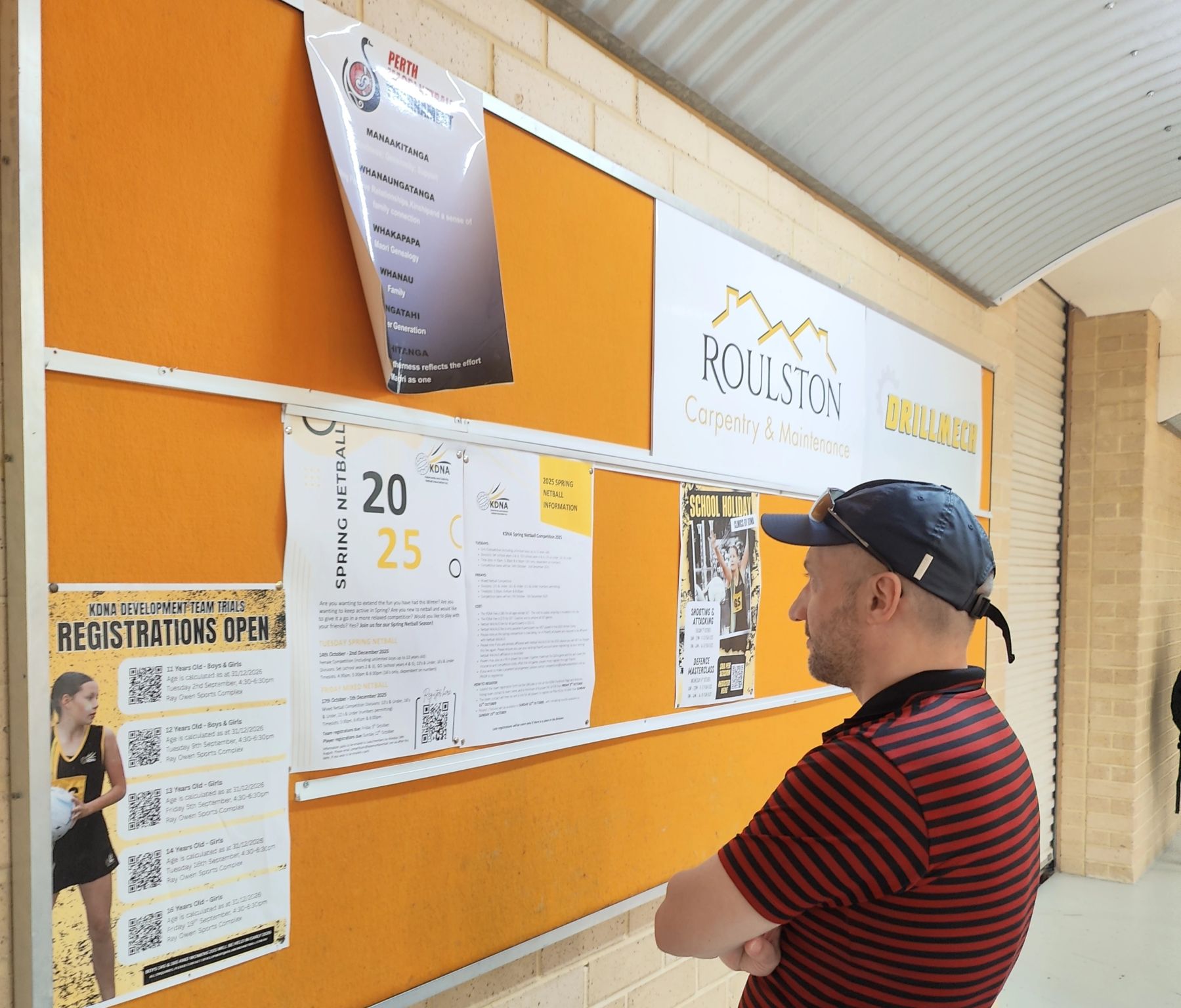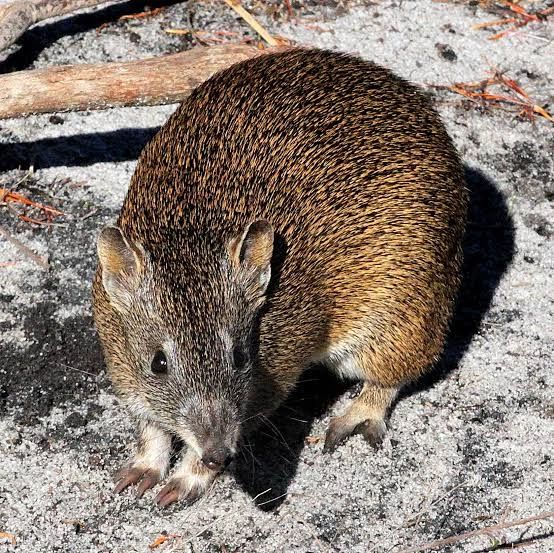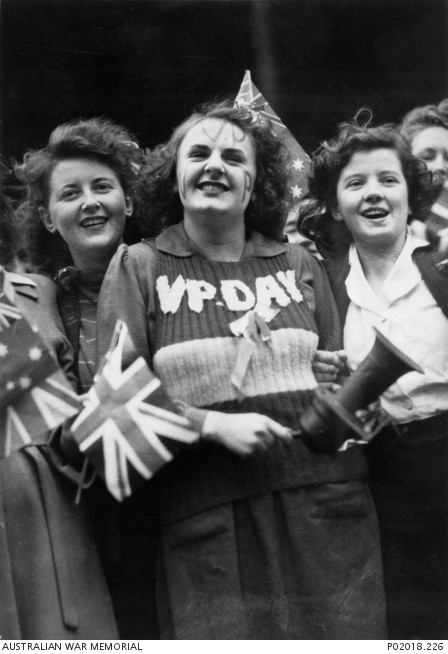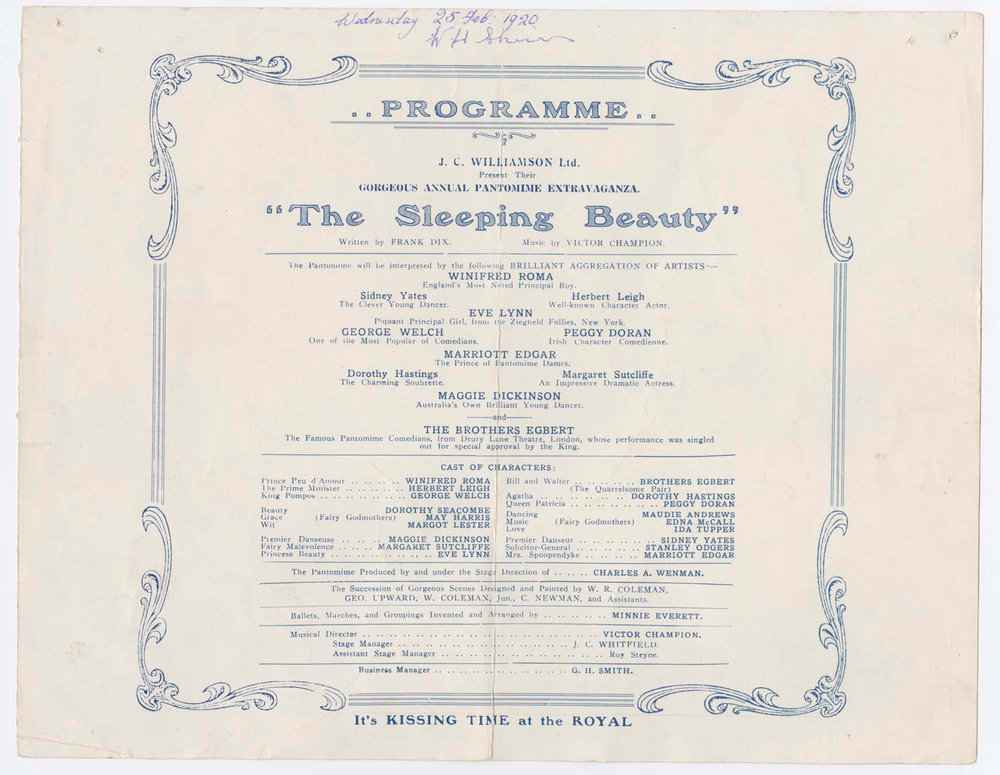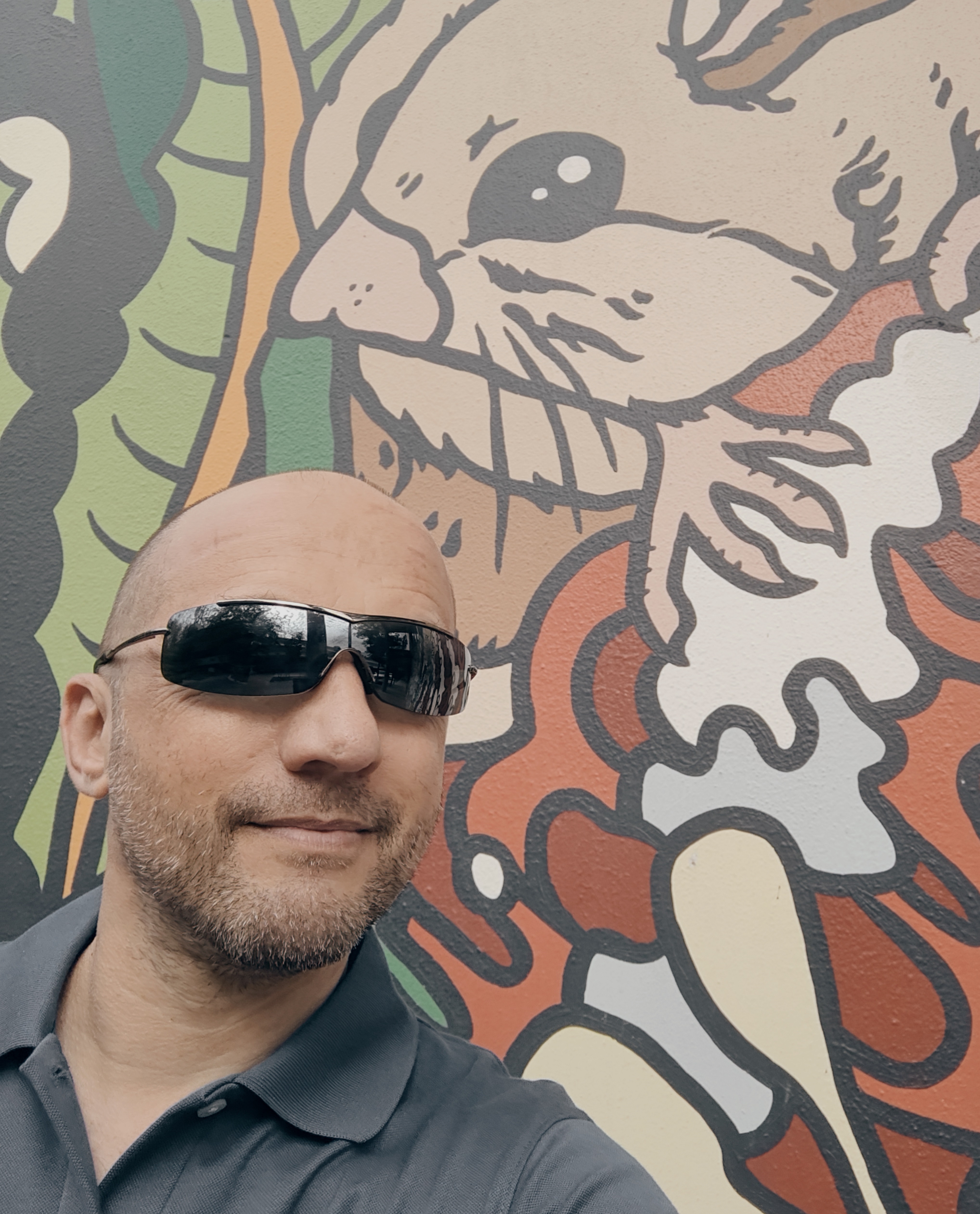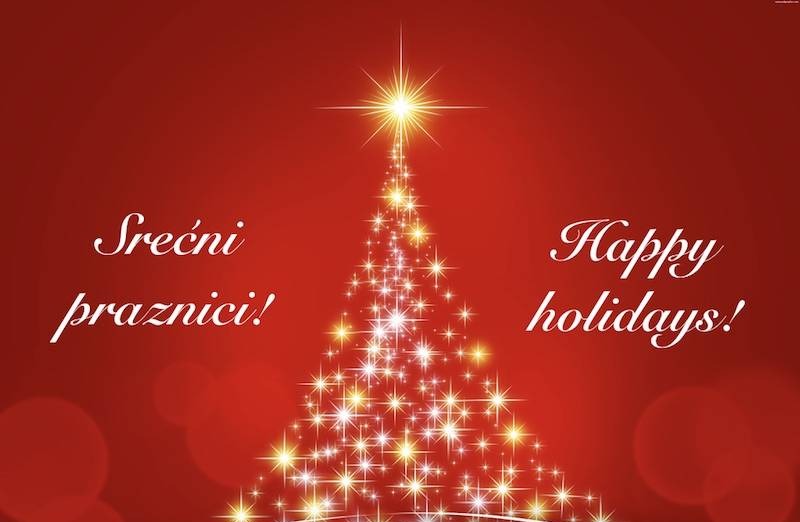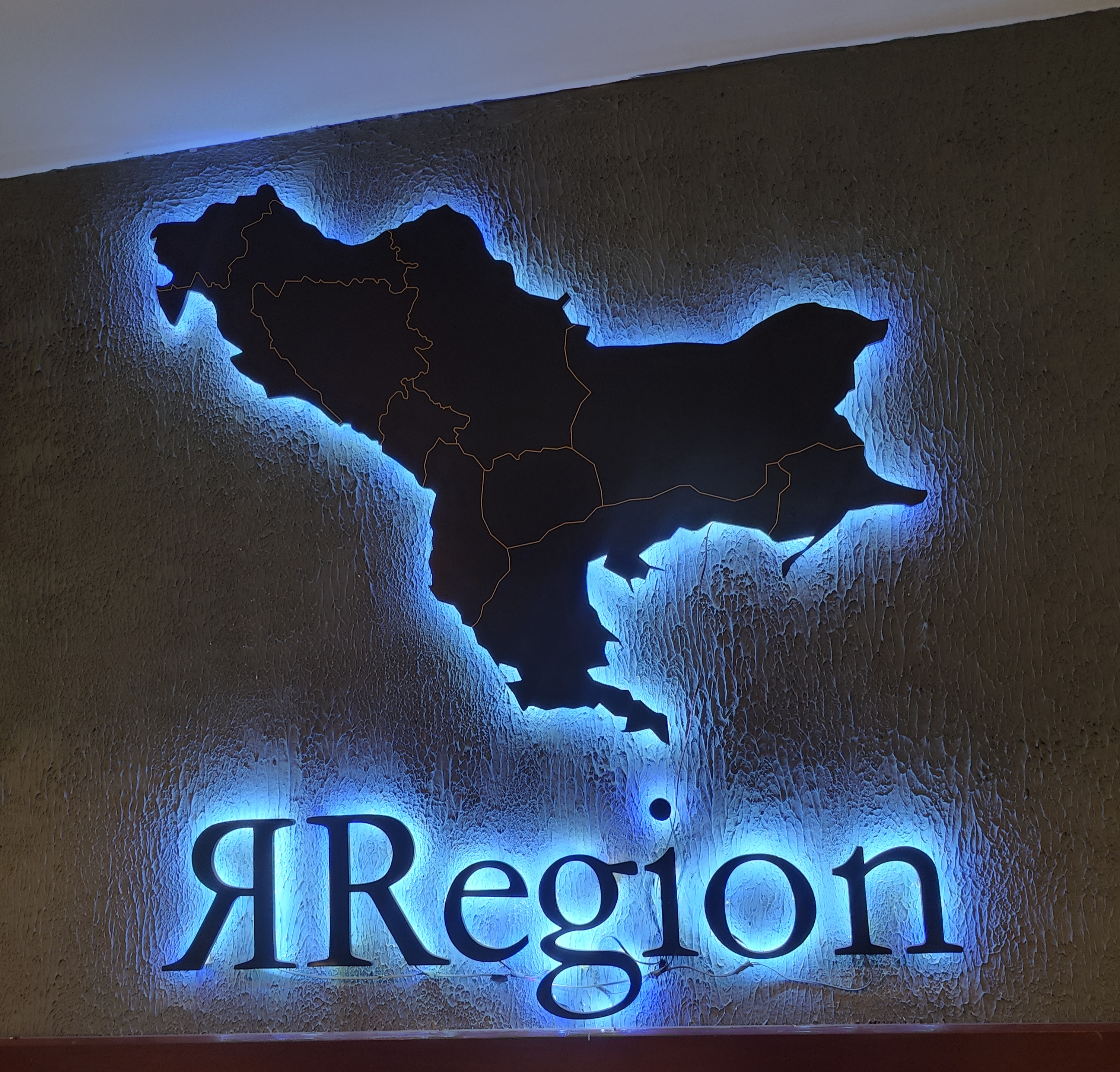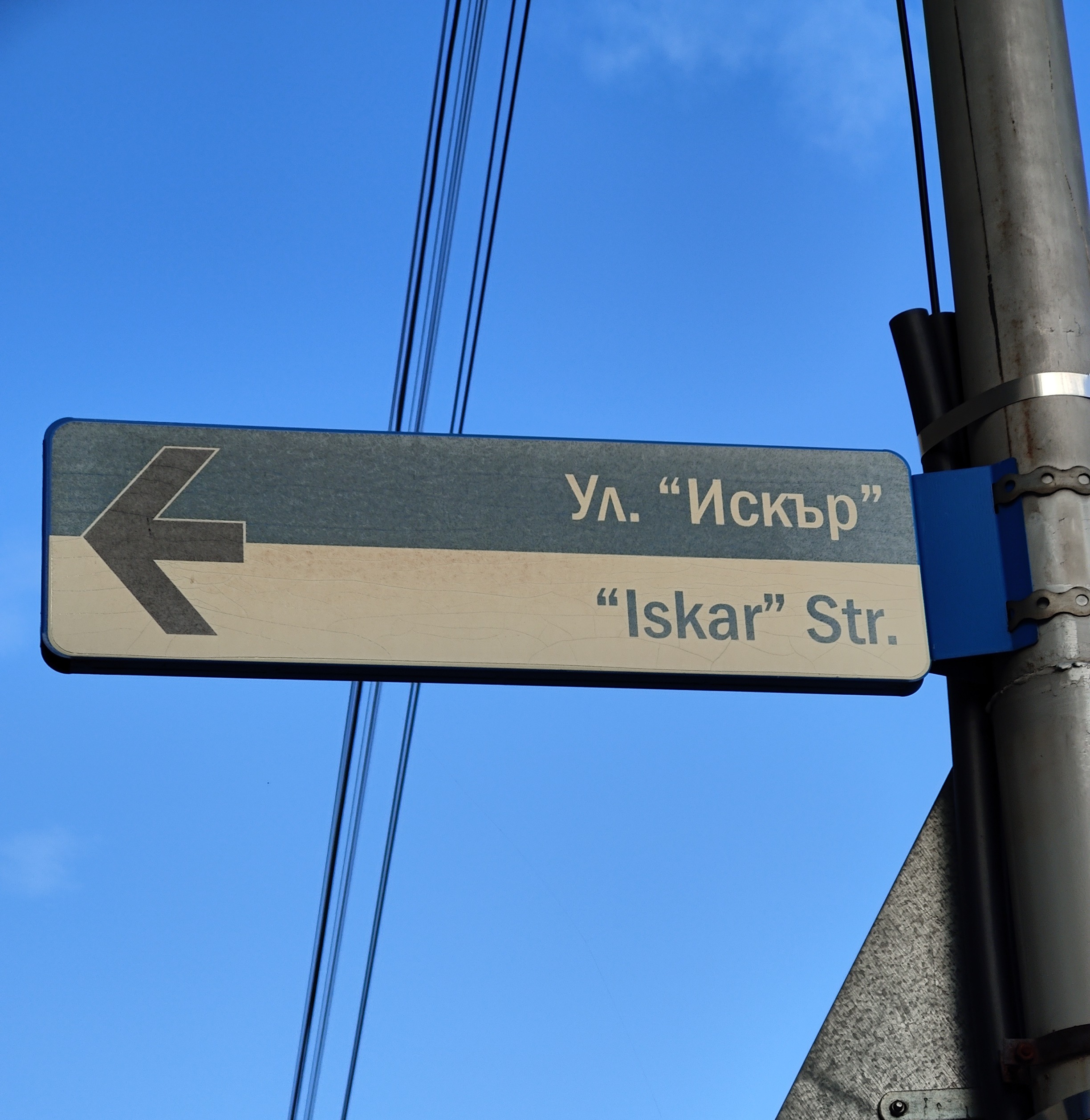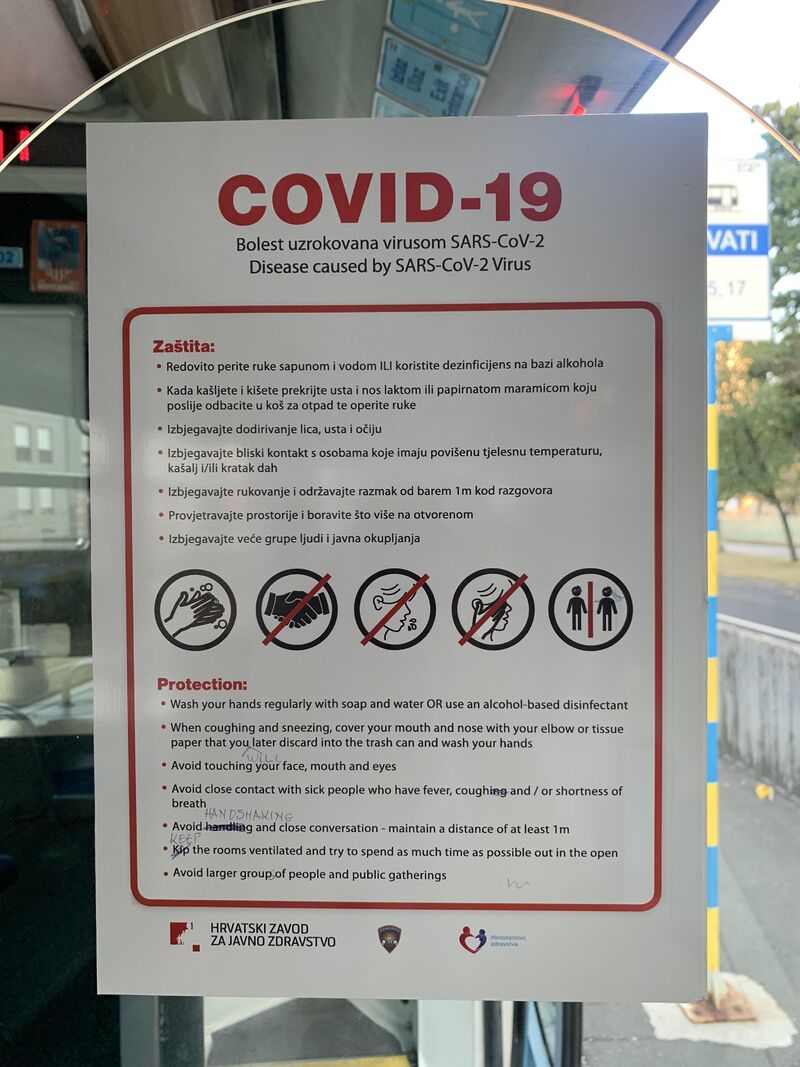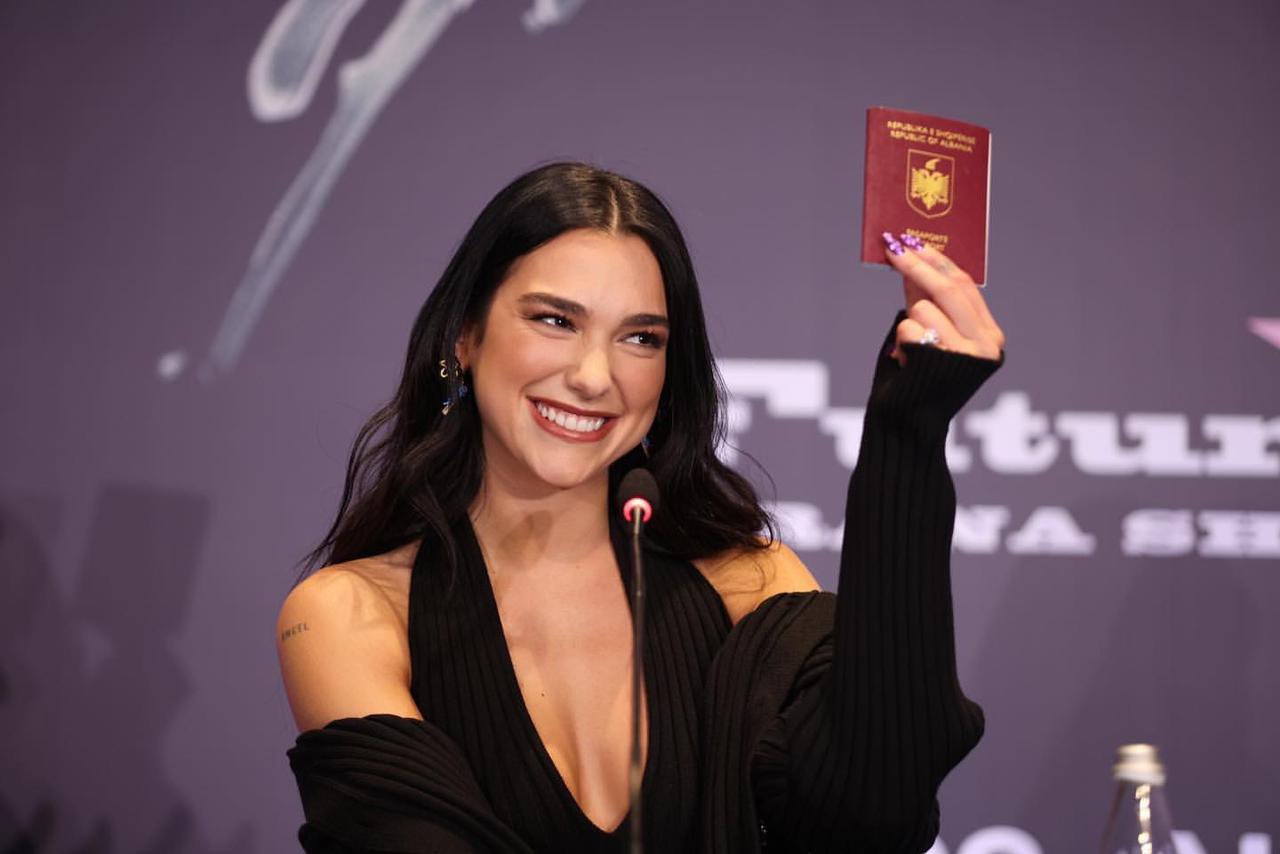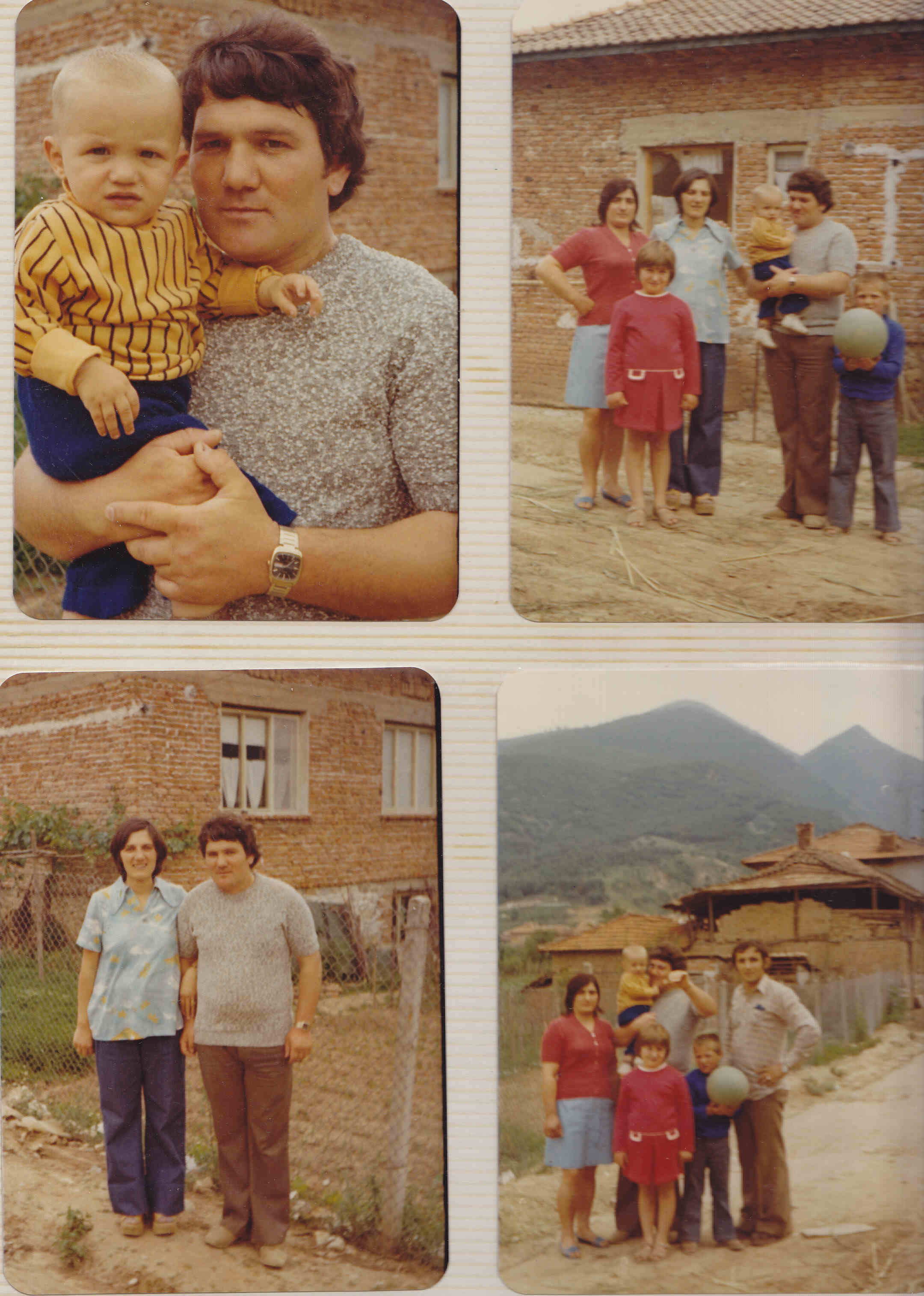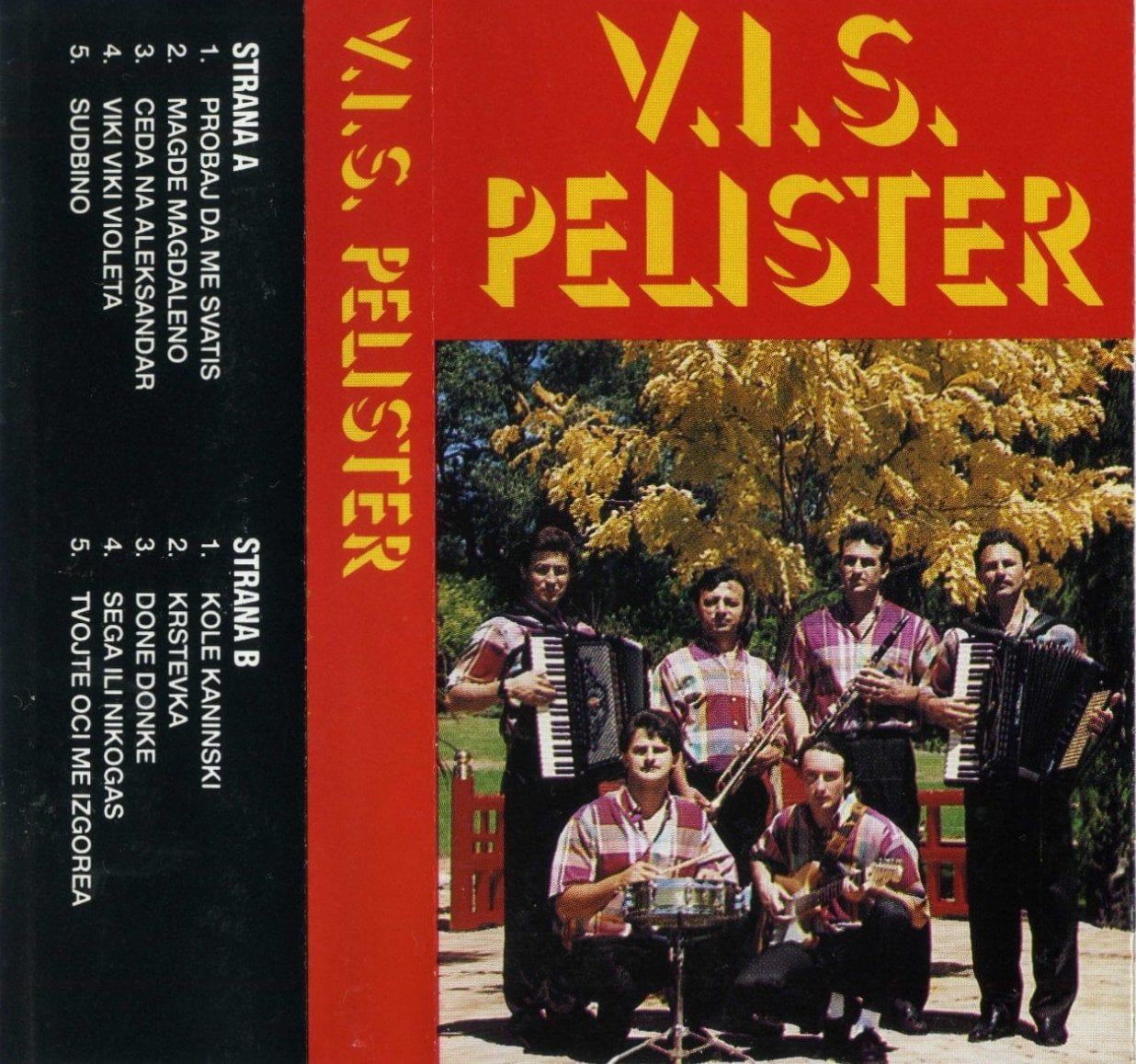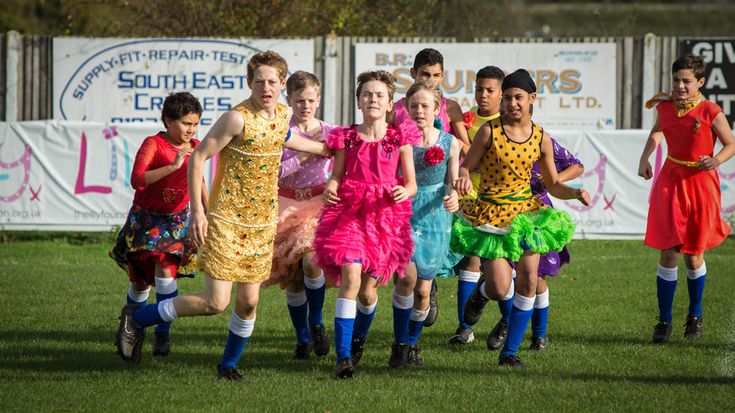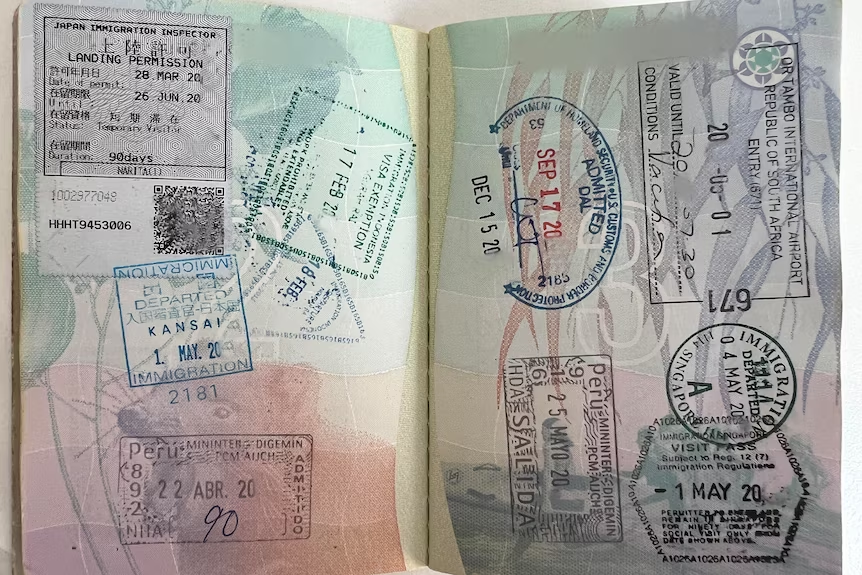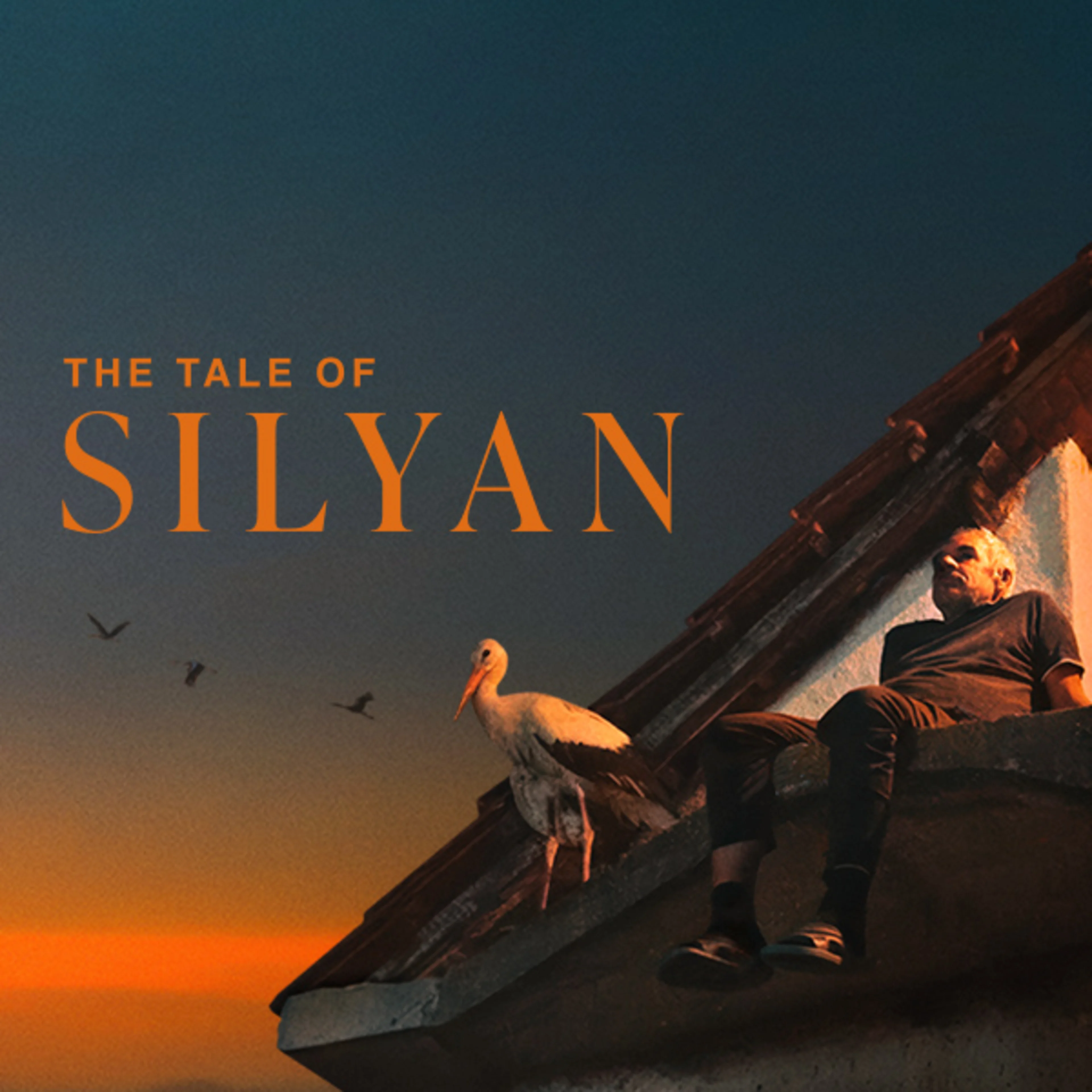Balkan nations love basking in the glory of their pasts. Whether it be past ancient societies that could mould wonderous items out of gold (such as the Thracians), medieval empires that stretched across the entire peninsula (such as the Serbian or Bulgarian ones), victories in huge battles wrapped in more myth than truth or having once a passport that once allowed them visa-free travel to most of the world, there isn’t a Balkan country not guilty of such grandiosity. But let’s face it… Balkan nations don’t really have the numbers to have the clout they crave. But lucky for most of them, they have a powerful ally with populations into the billions to piggyback on. Let’s call it a form of Balkan BIRGing – basking in reflected glory. Much like that tired cliché that the 12th member of the football/soccer team was the fans, only this time the numbers are reversed.
A classic case of this happened early in September 2025 when the Kosovar X/Twitter profile Kos Data, best known for its outright trolling (its never-ending online war with likewise Romanian nationalist Twitter/X profiles is what you’d expected), posted the picture below of Kosovan President Vjosa Osmani with US military officers at the West Point Military Academy in September 2024 with the caption:
“Sorry Russia and China. Kosovo and the USA together have the strongest army in the world”.
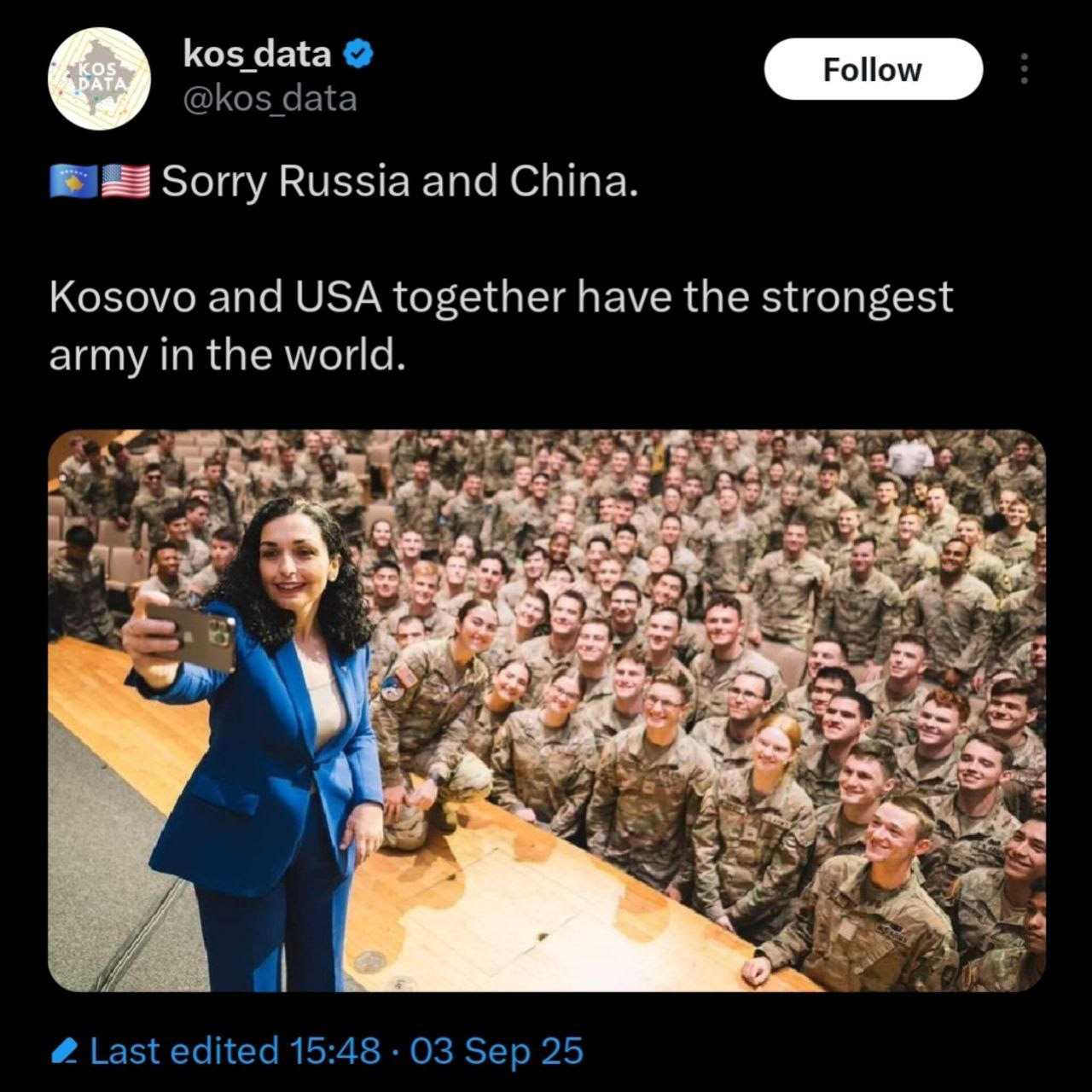
Rage bait? You betcha!
Not only does Kosovo not strictly have an army (it has a “security force”), but it’s rather fanciful that it would be to put the partially-recognised entity smaller than Connecticut on the same footing as the world’s most powerful country by far. Much like some Looney Tunes character-like chihuahua is putting up its dukes while the bulldog is behind it. And this boastful statement has been made even more jarring now that United States government has indefinitely suspended the planned “strategic dialogue” with Kosovo due to concerns about the actions of the Kosovo’s current caretaker government under prime minister Albin Kurti.
No guesses needed as to how this was greeted. Almost immediately and like clockwork, irate Serbs inundated the comments with the usual responses from anonymous accounts with names like “Serbs_Rule_4EVA!”, complete with an abundance of flag emojis, hyperbolic feelings passing off as “facts” and threats. Great for the algorithm and guaranteed engagement for days on endless online arguments that won’t change the world in the slightest no matter how many words they use.
The thing is that this was not particularly original of Kos Data to pad Kosovo’s prowess and numbers in such a degree to tip the scales way off. This actually has been a central part of the constant and extremely petty one-upmanship between Serbs and Albanians for the past century or so.
However, not all Serbs were outraged by this Kos Data tweet — many were quite amused at this obvious display of insecurity. But what stood out for many of them is that this was actually a reaction to a well-known Serb slogan of the same ilk and featuring one of the countries cut down by the Kosovars…
“Nas i Rusa, 300 miliona”
Literally translated: “us and the Russians, 300 million.”
Yes, it’s true – there are (particularly pro-Russian nationalist) Serbs boasting how they’re so allied with the Russians that they together make a solid block of 300 million people.
Serbia and Russia have been on-and-off allies for the past few centuries, with in recent years seeing this connection solidify with Russia vetoing any UN resolution on Kosovo to Serbia’s benefit, and Serbia being the only European country not to have placed sanctions on Russia since the start of the Ukraine conflict in 2022.
It’s the Slavic Orthodox connection that forms the basis for this union, as can be seen in the lyrics to the analogously titled 1993 song by ethnic Serb (and at the time nationalist) singer Miloje Bubanja.
“From the Dinaric Mountains to the quiet Don
Orthodox Christian bells are ringing
Us and the Russians, 300 million"
Typical for other songs from the time of the Balkans wars of the early 1990s, it pays particular emphasis on the regions of Bosnia and Croatia that Serb forces had control over, which in this case is the Dinaric mountains in the formerly Serb-populated Dalmatian hinterland of Croatia that at the time formed the core of the self-proclaimed Republic of Serbian Krajina. These lands are claimed as a Serbian dedovina, literally “Grandfatherland” or better translated as “ancestral lands”.
The “quiet Don” (Тихий Дон) is in reference to the river in southern Russia and is the title of the famous novel and later film, Quiet Flows the Don, for which its writer Mikhail Sholokhov won the Nobel Prize in Literature in 1965.
The sound of the gusle can be heard in the intro to Bubanja’s ode to Slavic Orthodox unity. The gusle is a bowed, single-string instrument that was once prevalent all throughout the Balkans but by the early 20th century could only be found being played in isolated mountain regions of Montenegro, and has since become a cultural icon immediately symbolising the small mountainous country (much like what the bagpipes are to Scotland). This is then an immediate audio cue to Bubanja’s Montenegrin heritage, a significant element as right into the 1990s the “us” in the slogan was not referring to “Serbs” but actually “Montenegrins”.
So yes, it’s originally a Montenegrin saying, and probably the most recognisable expression of the centuries-old, traditionally close ties between Montenegro and Russia.
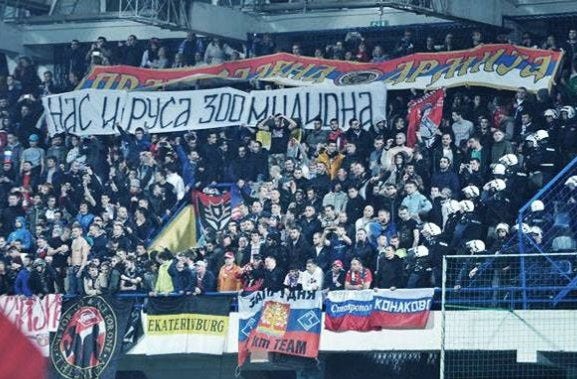
Much is speculated about the origins of this slogan. Some suspect that it dates from the early 18th century, when the tiny, nominally independent Principality of Montenegro, centred around its capital, the sleepy town of Cetinje, and ruled by a succession of bishop-princes, sought the protection of the only sovereign Slavic and Orthodox Christian empire at the time — Russia. Prior to that, it was the Venetians, who controlled most of Montenegro’s coastline, who were aiding the plucky Montenegrins in their interests of keeping them as a buffer from their rivals, the Ottoman Turks, in an arrangement more like “the enemy of my enemy is my friend”. After the Montenegrin forces had failed to fend off an army of tens of thousands of Ottoman Turks, in 1715 Bishop-Prince Danilo left Cetinje and headed via Europe to Russia. Danilo was warmly received by Peter the Great, who handed the Montenegrin bishop a charter recognising the merits of the Montenegrins in their joint battle against the Ottoman Turkish Empire. In that charter, Peter I advised Bishop Danilo to make peace with the Ottomans, but should the sultan start hostilities again with the Montenegrins, then Peter the Great promised the Montenegrins could expect Russia’s help with weapons. The success of Danilo's trip established what would end up being close ties between Russia and Montenegro, as reflecting in the slogan that took root among Montenegrins: “We and the Russians are two hundred million”.
Wait! 200 million? Wasn’t it 300 million before?
Well, let’s look at the figures. It’s estimated that the population of the Russian Empire was only around 15 million at the time of Bishop Danilo’s visit, and then adding the few thousand Montenegrins within the confines of the miniscule principality at the time — that doesn’t even come anywhere near to the 200, let alone 300, million boasted in the slogan. Something’s not right here then.
The reason being is that “300 million” is a new, updated calculation that only appeared in the 1990s at the time Miloje Bubanja was singing about it. Talking in round figures, the 300 million comes from the 280 million people that made up the Soviet Union (yes, yes, I know that Russians only made up half of the Soviet Union’s population, but we’re talking about blind nationalism here, so logic is out the window) and the remaining 20 million was roughly the population of Yugoslavia, which according to the most radical of Serb nationalist, were all really Serbs in one way or another. Hey, no-one said that it was supposed to make sense.
You see, for most of the 20th century, the numbers used in the saying fluctuated. The first time I found out about this (as it was billed at the time) “historic” slogan, the figure was a more accurate 150 million, but it would often be rounded up to 200 million. Going by these numbers, we can get a more likely time origin of the slogan…
“Don't be afraid of anything, believe in God and look towards Russia” was what old Montenegrin sages advised the 17-year-old Rade Tomov, otherwise known as Petar II Petrović or, more popularly, Njegoš, Montenegro’s most legendary ruler, when he ascended to the throne in 1830. And before you ask, yes, the character of Njegus in the operetta the Merry Widow (set in the Balkan principality of “Pontevedro”… gettit?) is in reference to him. This view of Russia as the superior and inspiration pretty much set the tone for the cultural, social and political progress of Montenegro and all Balkan Slavic Orthodox Christian nations. Montenegro could count on imperial Russia as its trusted ally right up to the fall of imperial Russia in 1917 and Montenegro’s forcible incorporation into the Kingdom of Serbs, Croats and Slovenes (later Yugoslavia) soon after.
So working with 150 million, the slogan more likely emerged in the early 20th century, with some pinpointing it to February 9th 1904, the day after the start of the Russo-Japanese war, when in sympathy with Mother Russia miniscule Montenegro declared war on faraway Japan. Yes, the Japanese are still shaking in their boots over that, hehe!
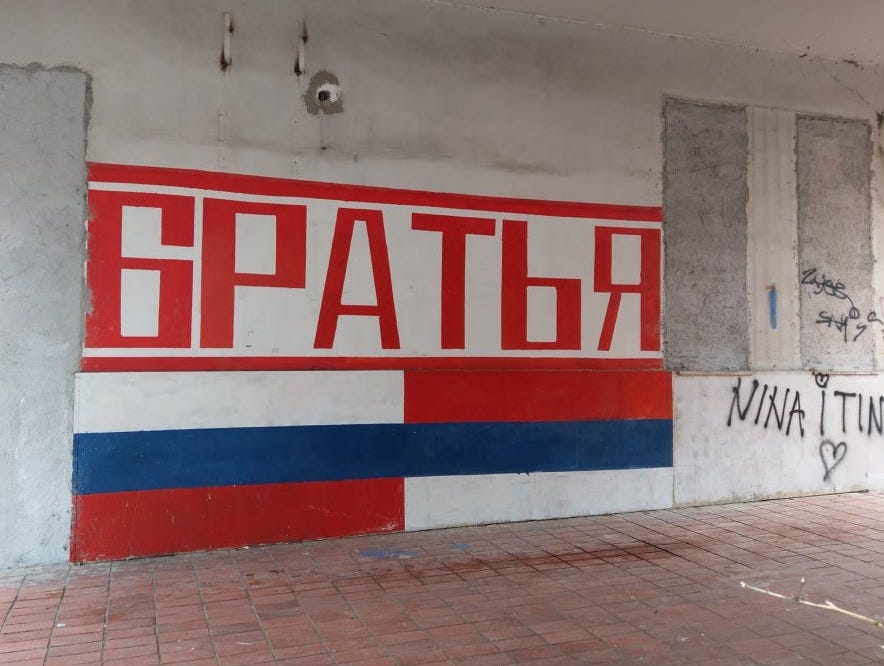
It should be noted that while many Serbs now will revel in their “long-held bond” with the Russians, this was not the case for the most part during socialist Yugoslavia. After Tito demonstrably split from Stalin in 1948, for years in Yugoslavia showing overt or perceived support for the Soviet Union (and in that token, Russia) landed many in Goli Otok, Tito’s notorious island death camp. In 1968 there was genuine fear and panic that following the Soviet invasion of Czechoslovakia to quell Dubček’s Prague Spring that Yugoslavia was next, bringing anti-Russian sentiment in Yugoslavia to a peak. Unlike in neighbouring Bulgaria (the true Balkan darling of the Russians for most of the second half of the 20th century), Russian was not a compulsory school subject in Yugoslavia. The few Yugoslav students who opted for Russian were seen to be taking the “easy way out”, and as a language was considered “uncool” compared to learning English, French or German. Fuelling all this, and with the far more open nature of Yugoslavia’s socialist system providing unimpeded international travel (those red passports mentioned before), rock’n’roll music and decadent western fashions otherwise curtailed in neighbouring Soviet-aligned Eastern Bloc countries, Yugoslavs had a major superiority complex about themselves – they looked down on Soviets (i.e. Russians) and their eastern neighbours as “backward” and “unsophisticated” in comparison. These attitudes only slowly started to change amongst Serbs in the late 1980s, when Slobodan Milošević reignited Orthodox Christian-based nationalism for his own personal gains.
Cut to today and all throughout Serb-populated areas of ex-Yugoslavia, it doesn’t take long to find graffiti and murals in public places loudly proclaiming the tight bond between Serbs and Russians. Serb politicians in Bosnia and Herzegovina (in particular) now appeal to Russia under Putin for “protection”, continuing a role Russia carved for itself in the 19th century. “Serb” pop icons Goran Bregović (Croat father) and Emir Kusturica (of Bosniak origin) are huge stars in Russia. But the most curious development in this Russian-Serb link-up has been the recent airing of Russian soap operas on Serbian TV. This is remarkable as in the face of competition from the far slicker product from the west, and in stark contrast to what happened in neighbouring Bulgaria during communist times, Soviet (and therefore Russian) pop culture barely made a ripple in Yugoslavia. Bulgarians above 50 grew up watching Russian films every Friday night on TV, listening to Russian pop songs (they all know Alla Pugacheva and her million scarlet roses or harlequin) and watching Russian cartoons and animation (Cheburashka!) but you’d be hard-pressed to find a Serb who even knows any of these.
But things were slightly different when it came to the Montenegrins during Yugoslav times. Simmering below the surface, the Russian connection remained there. The most enduring example of this was when legendary Russian bard Vladimir Vysotsky filmed a TV special in Yugoslav Montenegro in 1974, and penned a song in praise of the republic (“it’s sad that Montenegro did not become my second homeland”), thereby solidifying his star status in Montenegro to the point that there’s a monument dedicated to him the country’s capital Podgorica.
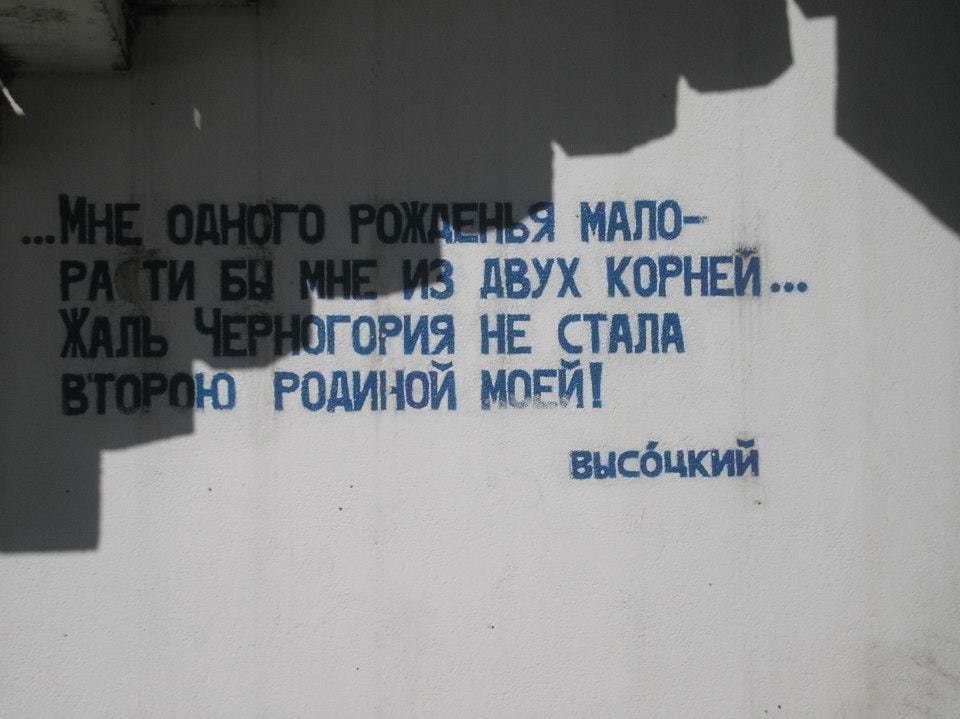
It certainly has been a major turn in events in the past decade where the same Montenegrins who for centuries made close ties to the Russians a central part of their national identity now go so openly against them. Montenegro joined NATO in 2017, effectively making Russia its enemy, and to show its commitment to joining the EU (in negotiations that have now dragged into their 14th year, and with no signs of any breakthrough) and in defiance to popular sentiment in the country, the country’s government has applied full economic sanctions on its historic protector.
Now the Montenegrins or Serbs are not alone here, for Kos Data could have been looking closer to home for their inspiration…
The Serbs/Montenegrins and the Albanians have had much beef over the decades — it’s not new. In the end, as we’ve seen with the Kos Data statement, most of it ends up being mired in petty one-upmanship, but this wasn’t the first time that Albanians have leaned on their much bigger brother to inflate their numbers.
It’s often claimed that Enver Hoxha, Albania’s hard-line Stalinist dictator who ruled the country with an iron fist from 1944 to his demise in 1985, and had allied the country with the People’s Republic of China under Chairman Mao in the 1960s and 1970s, also took a leaf out of, or more likely in spite of, the Montenegrin book and proclaimed…
“Along with Chinese, Albanians make up a quarter of the world’s population”
So take that, you Montenegrins/Serbs; the Albanians outnumber you, even with your Russian friends. Ha! Balkan inat strikes again!

Just some background: following Soviet leader Khrushchev’s denouncement of Stalin’s crimes, China under Mao Zedong and Albania under Enver Hoxha ended solidarity with the USSR and kept to what they believed to be Stalin’s true vision of Communism. The two countries then became close allies, with China stepping in place of the USSR in providing aid, technical assistance and machinery to Albania. In turn, Albania throughout the 1960s became “China’s outpost in Europe”. There were cultural exchanges, so Albanian films became, and still are, a big thing in China. The most extreme phenomenon to come out of this ideological bond was when in emulation of what was happening in the China at the time, in 1967 Hoxha also embarked Albania on a “Cultural and Ideological Revolution”, the most enduring aspect of which was a draconian ban on all forms of religion and the proclamation of Albania as the world’s first fully atheistic state.
Just one thing though…
Did Enver Hoxha really say that Albanians make up a quarter of the world’s population?
If we look at popular parlance at the time, as well as the statistics, Chinese people did make up roughly a quarter of the world’s population in the 1960s and 1970s. However, a search on the net looking for sources of this supposedly Enver Hoxha quote revealed two things:
- Just like how there are varying figures with Montenegrins/Serbs and Russians, so too with the Albanians. Some claim it was “a quarter” of the world’s population, others “a fifth” and most recently “an eighth”. Those last two portions don’t add up as the Chinese only started making up less than a quarter of the world’s population in 1987, two years after Hoxha died and a good decade after China and Albania went from best buddies to bitter enemies.
- I couldn’t find a direct quote from Enver Hoxha in English, so I tried finding something in Albanian. The result – nothing, zilch, asgjë, hiç!
Still, that didn’t stop apparently UK Channel 4’s Senior Political Correspondent Paul McNamara from quoting this or, for that matter, many other westerners. Do I believe that Enver Hoxha ever say this? There’s nothing to suggest that he did. But could there have been some Albanian propagandist back in the day who said or wrote this, perhaps as read out on Radio Tirana’s English service by the iconic New Zealand-born Māori presenter June Taylor back in the Cold War days, then that’s probable. And in light of Albania’s stature at the time and its role as spokesperson for Mao’s China at the United Nations (Taiwan represented China in the UN until 1971), then the Albanians were truly representing a quarter of the world’s population at the time.
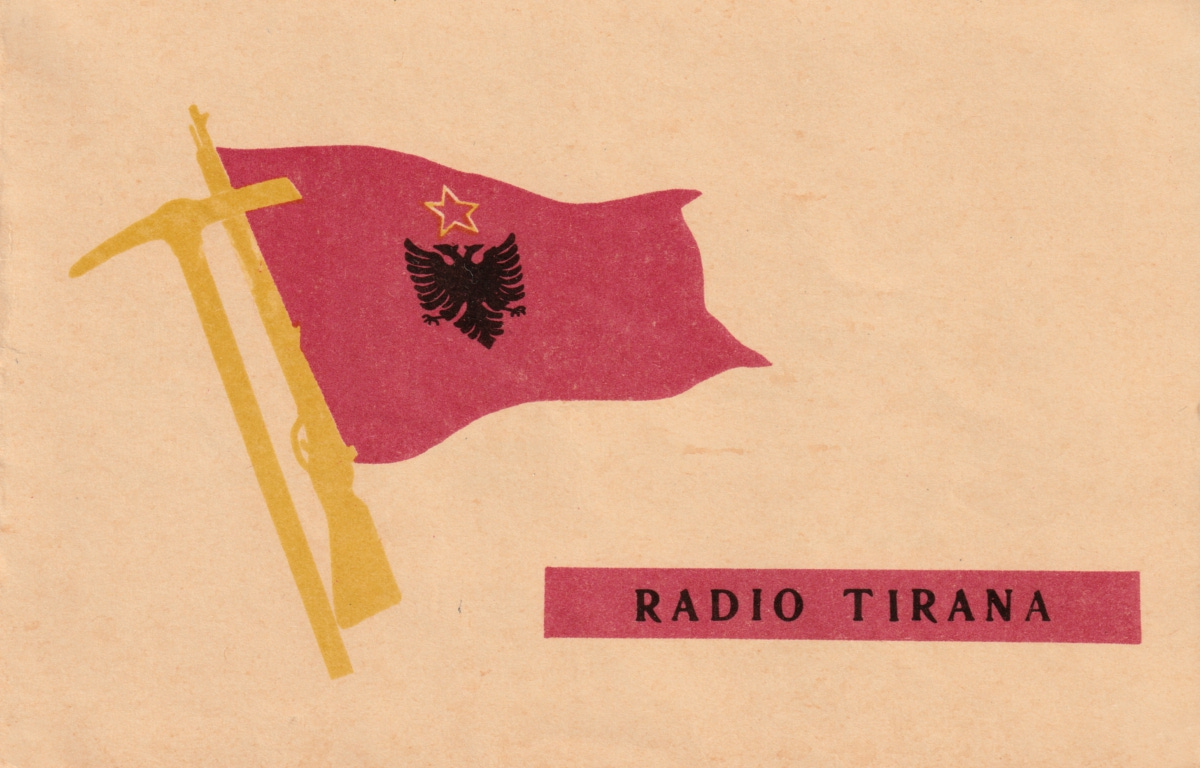
What this piggy-backing is supposed to display by all who propagate such slogans is how powerful these countries are, but the reality is that it actually shows the opposite. That you need a big brother to provide the muscle and numbers in a battle of “look who’s bigger” says more about insecurities with self-identity and worth than anything else. And also, perpetuating myths of monolithic and “centuries-old” links shrouds the reality that all relations ebb and flow over time. The best way forward would be to move on and accept what we are and what numbers we have. Once that is achieved, then the national anxieties that eventually feed the forces and factors that lead to conflict will be gone and then we can truly have peace. It all starts with ourselves. Along with every human on this planet, it’s us that make up this world.























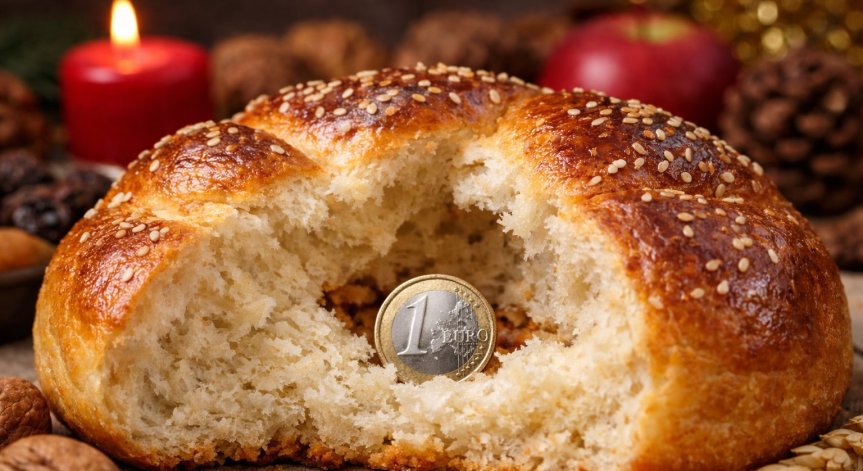



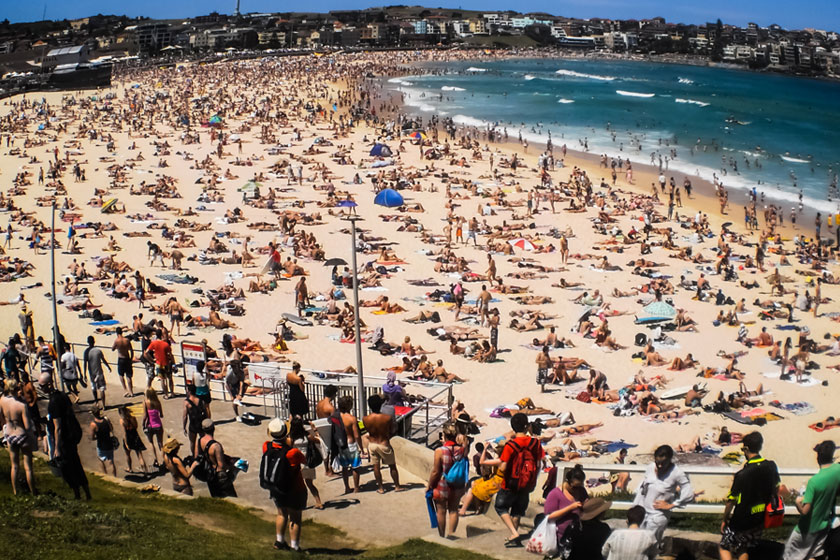
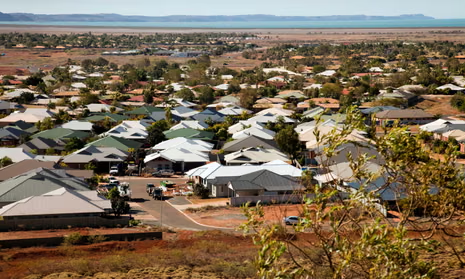
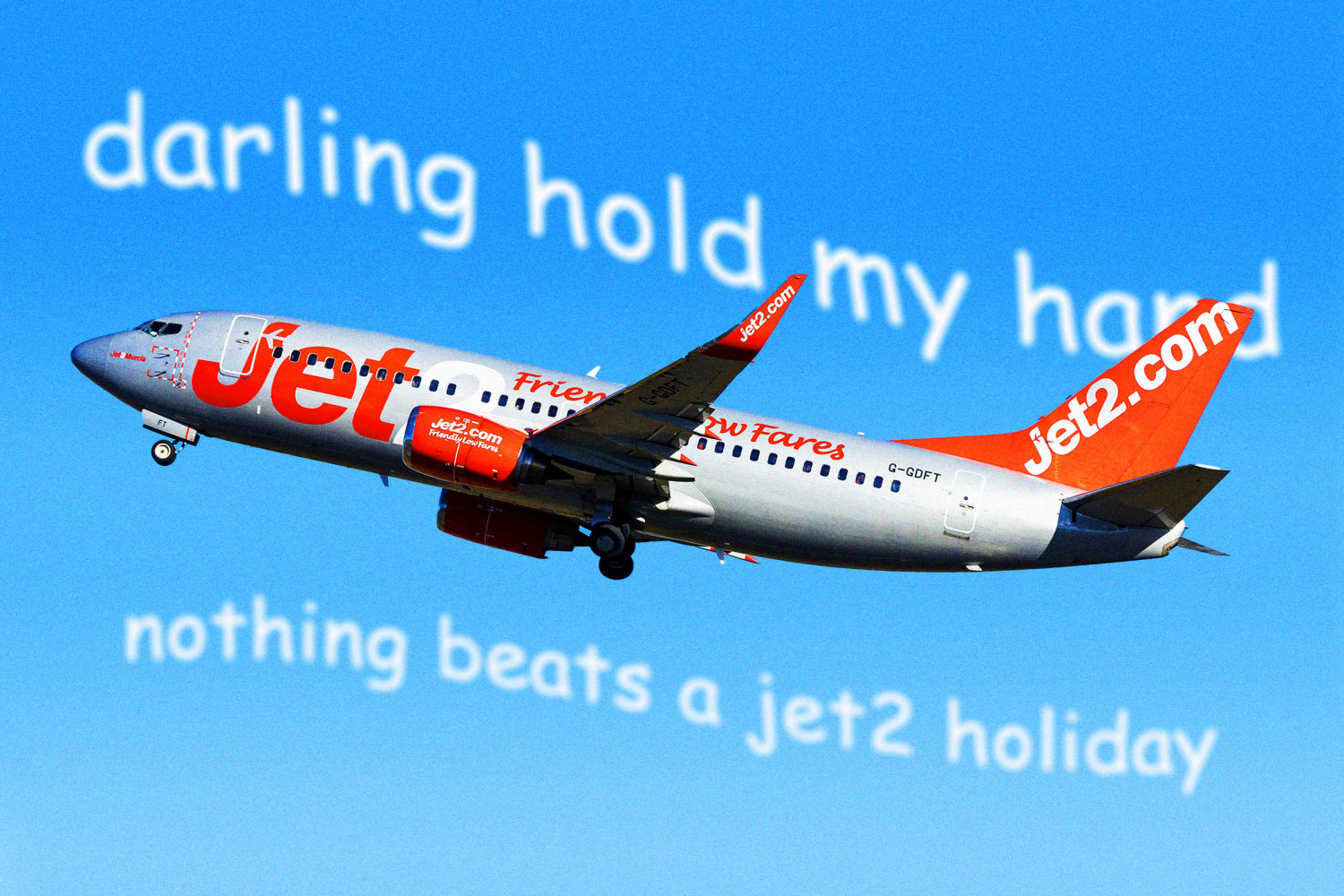





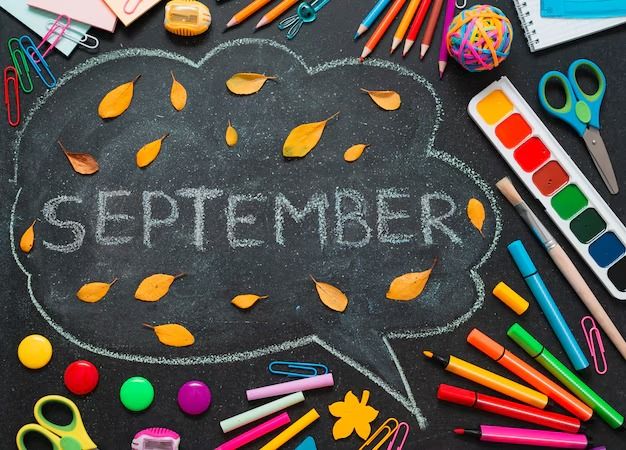


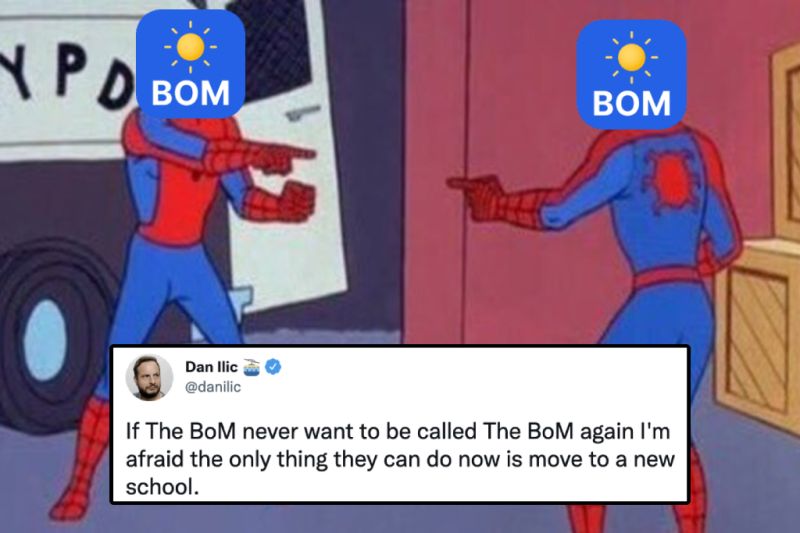
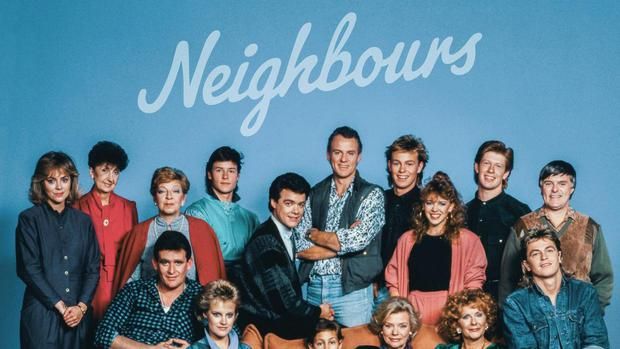




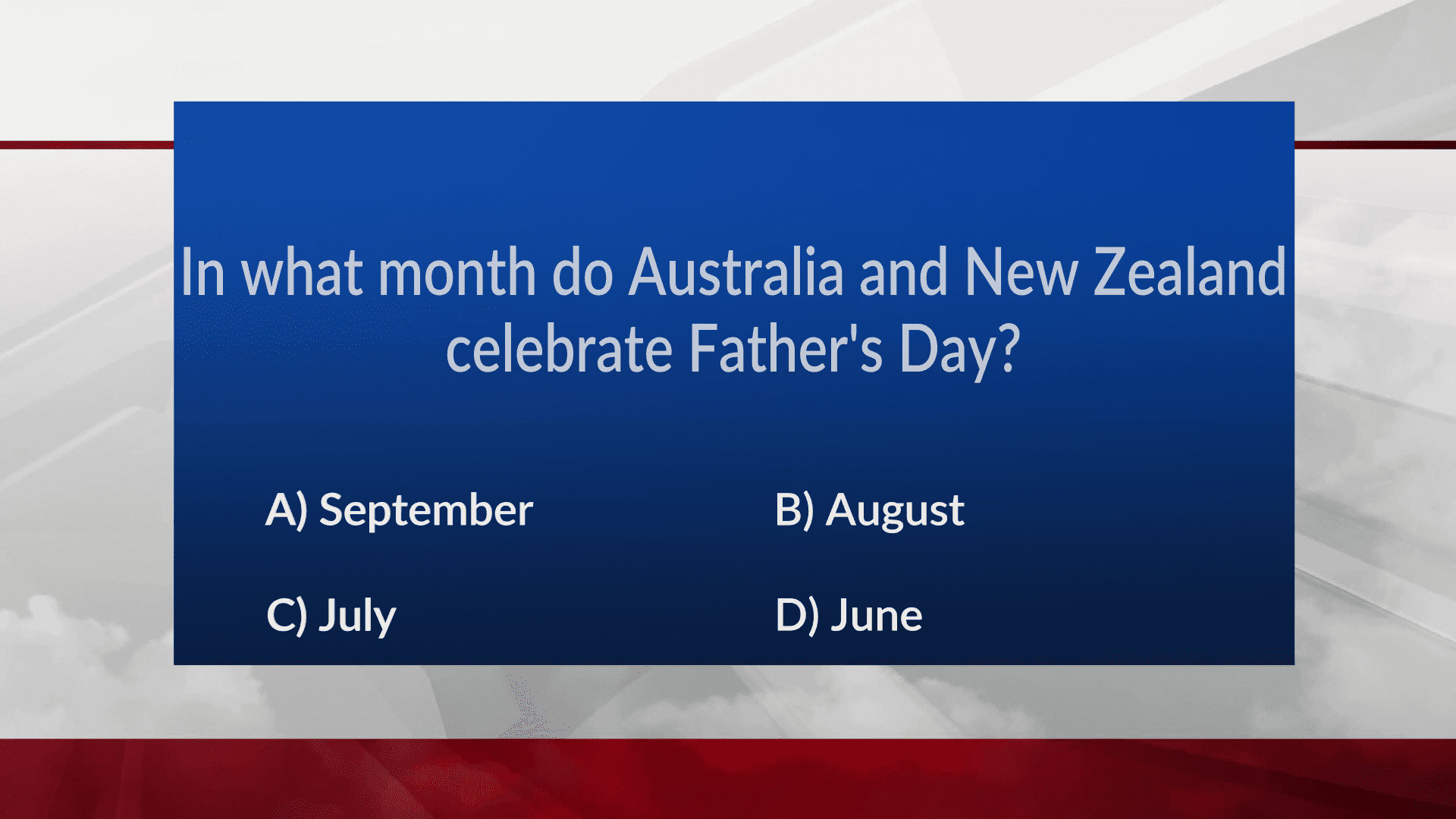















































.%20A%20day%20of%20campaigning%20%E2%99%80%20%E2%80%A6%20or%20a%20day%20to%20buy%20flowers%20%F0%9F%92%90.jpg)

